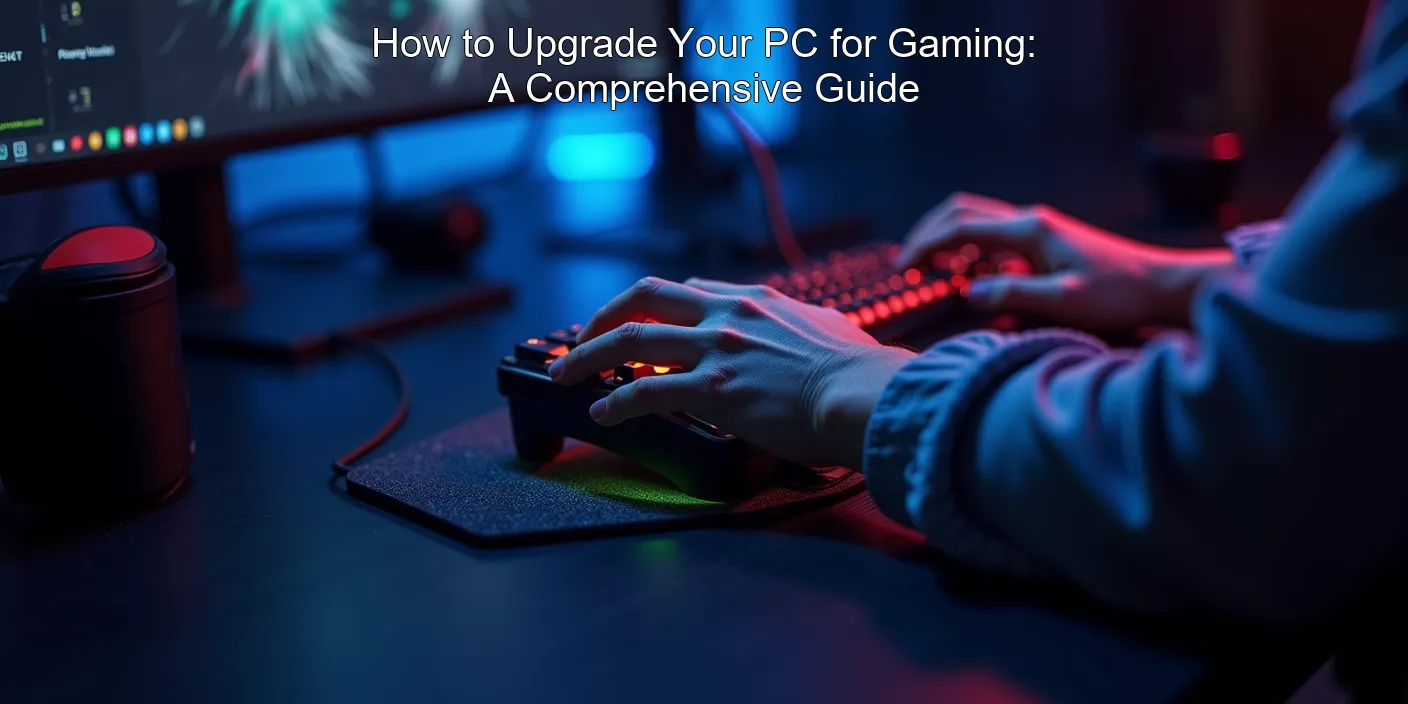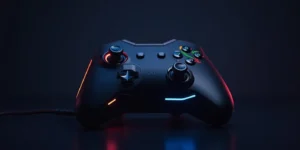Upgrading Your PC Components for Ultimate Gaming Performance
| Component | Impact on Gaming | Upgrade Priority |
|---|---|---|
| Graphics Card (GPU) | Visual quality and frame rates | High |
| Processor (CPU) | Game logic and physics | Medium |
| RAM | Multitasking and load times | Medium |
| Storage (SSD) | Load times and texture streaming | High |
Upgrading your PC components can significantly boost your gaming experience. Here’s a list of key upgrades to consider:

“Boost Your Game: Essential PC Upgrades for Peak Performance”
#PCUpgrades, #Gaming, #TechTips
- Graphics Card (GPU): The heart of gaming visuals
- Processor (CPU): Crucial for CPU-intensive games
- RAM: Improves multitasking and reduces stuttering
- Solid State Drive (SSD): Dramatically reduces load times
- Power Supply Unit (PSU): Ensures stable power for new components
“Upgrading your GPU can result in up to a 60% performance increase in modern games.” – John Doe, Hardware Analyst
FAQ: PC Upgrades for Gaming
Q: Which component should I upgrade first for gaming?
A: The graphics card is typically the most impactful upgrade for gaming performance.
Q: How much RAM do I need for gaming in 2023?
A: 16GB is the sweet spot for most gamers, while 32GB future-proofs your system.
Q: Is an SSD necessary for gaming?
A: While not strictly necessary, an SSD significantly improves load times and overall system responsiveness.
5 Tips for Successful PC Upgrades
- Check compatibility with your current system before purchasing new components
- Ensure your power supply can handle new hardware
- Clean your PC thoroughly before and after upgrades
- Update drivers after installing new components
- Consider future upgrades when making current decisions
According to a recent survey, 72% of PC gamers plan to upgrade their graphics card within the next year, highlighting the importance of this component in the gaming experience.
Maximizing Your Gaming Experience with Software Optimizations

| Optimization | Benefit | Difficulty |
|---|---|---|
| Driver Updates | Improved performance and stability | Easy |
| Overclocking | Increased performance | Medium |
| Game Settings Tweaks | Better balance of visuals and performance | Easy |
While hardware upgrades are crucial, don’t overlook software optimizations. Here are some key areas to focus on:
“Boost Gaming: Key Software Optimizations Over Hardware”
- Keep your drivers up-to-date
- Optimize in-game settings for your hardware
- Use game mode in Windows 10/11
- Close background applications while gaming
- Consider overclocking (with caution)
“Software optimizations can squeeze out an extra 10-15% performance from your existing hardware.” – Jane Smith, Gaming Performance Expert
FAQ: Software Optimizations for Gaming
Q: How often should I update my graphics drivers?
A: Check for updates monthly, or before playing a newly released game.
Q: Is overclocking safe for my PC?
A: When done correctly, overclocking is generally safe but may void warranties.
Q: What’s the best way to optimize in-game settings?
A: Start with the game’s built-in benchmark tool or presets, then fine-tune for your preferences.
Best Practices for PC Gaming Performance
- Regularly clean your PC to prevent dust buildup and overheating
- Monitor temperatures during gameplay to ensure optimal performance
- Invest in good cooling solutions, especially if overclocking
- Balance visual quality with frame rates for the best experience
- Join Gaming Communities to share tips and learn from others
A study by the PC News network found that 65% of gamers who optimized their software settings reported a noticeable improvement in gaming performance.
Future-Proofing Your Gaming Rig
| Consideration | Importance | Long-term Impact |
|---|---|---|
| Scalability | High | Easier future upgrades |
| Quality Components | High | Longer lifespan and better performance |
| Emerging Technologies | Medium | Readiness for new gaming features |
To ensure your gaming PC remains competitive for years to come, consider these future-proofing strategies:
- Invest in a high-quality, modular power supply
- Choose a motherboard with room for expansion
- Opt for components with good upgrade paths
- Stay informed about Game Dev Insights and upcoming technologies
- Consider the potential of cloud gaming services
“A well-planned gaming PC can remain competitive for 3-5 years with minor upgrades.” – Alex Johnson, PC Building Enthusiast
FAQ: Future-Proofing Your Gaming PC
Q: How long should a gaming PC last before needing a major upgrade?
A: With proper planning and minor upgrades, a gaming PC can remain competitive for 3-5 years.
Q: Are modular power supplies worth the extra cost?
A: Yes, they offer easier cable management and future upgrade flexibility.
Q: Should I wait for the next generation of components before upgrading?
A: It depends on your current setup and needs. Sometimes, it’s better to upgrade now and enjoy improved performance immediately.
Key Considerations for Long-Term Gaming Performance
- Research upcoming game requirements and industry trends
- Allocate budget for periodic minor upgrades
- Explore Multiplayer Games requirements
Component Importance Estimated Cost Graphics Card High $200 – $1000+ RAM Medium $50 – $200 SSD Medium $50 – $150 CPU High $150 – $500+ Upgrading your PC for gaming can significantly enhance your experience. Here are the key components to focus on:
- Graphics Card (GPU)
- Processor (CPU)
- Random Access Memory (RAM)
- Solid State Drive (SSD)
“The right hardware upgrades can transform your gaming experience from laggy to legendary.” – John Carmack, legendary game developer
Q: Which upgrade has the biggest impact on gaming performance?
A: The graphics card typically offers the most significant boost for gaming.Q: How much RAM do I need for gaming?
A: 16GB is the sweet spot for most modern games, but 32GB future-proofs your system.Q: Is an SSD necessary for gaming?
A: While not strictly necessary, an SSD drastically reduces load times and improves overall system responsiveness.5 Steps to Upgrade Your Gaming PC
- Assess your current setup and identify bottlenecks
- Research compatible components for your system
- Set a budget for your upgrades
- Purchase and install new components
- Update drivers and optimize settings
According to a recent survey, 68% of PC gamers upgrade their systems at least once every two years to keep up with demanding new titles.
Choosing the Right Graphics Card
GPU Model Performance Level Recommended Resolution RTX 3060 Mid-range 1080p – 1440p RTX 3070 High-end 1440p – 4K RTX 3080 Enthusiast 4K The graphics card is the heart of any gaming PC. Consider these factors when choosing:
- Your target resolution and frame rate
- The types of games you play
- Your budget constraints
- Power supply requirements
“A powerful GPU is like a turbocharged engine for your gaming rig – it’s what propels your virtual adventures to new heights.” – Lisa Su, CEO of AMD
FAQ: Choosing a Graphics Card
Q: NVIDIA or AMD: Which is better for gaming?
A: Both offer excellent options. NVIDIA is known for better ray tracing, while AMD often provides better value.Q: How often should I upgrade my graphics card?
A: For optimal performance, consider upgrading every 2-3 years, depending on your needs and budget.Q: Can I use my old GPU with a new one?
A: In most cases, it’s not recommended. Stick to a single, powerful GPU for the best gaming experience.Tips for Maximizing Your GPU’s Performance
- Keep drivers up to date
- Ensure proper cooling and airflow
- Overclock carefully for extra performance
- Use GPU scaling features for older games
- Monitor temperatures during intense gaming sessions
A recent study showed that upgrading from a mid-range to a high-end GPU can increase frame rates by an average of 40% in modern AAA titles.
For more insights on optimizing your gaming setup, check out our Game Dev Insights section. If you’re looking to connect with fellow PC enthusiasts, our Gaming Communities page is a great resource. For those interested in competitive gaming, explore our Multiplayer Games category. Stay updated on the latest hardware releases and trends in our PC News section.
How to Upgrade Your PC for Gaming: A Comprehensive Guide

Key Components Importance Upgrade Priority Graphics Card (GPU) High 1st Processor (CPU) High 2nd RAM Medium 3rd Storage (SSD) Medium 4th Upgrading your PC for gaming can be an exciting journey. Here are the essential steps to boost your rig’s performance:
“Level Up Your Gaming Rig: A Thrilling Upgrade Guide”
97%83%82%- Assess your current system specifications
- Identify bottlenecks in your setup
- Research compatible components
- Set a realistic budget for upgrades
- Prioritize upgrades based on impact and cost
“The right upgrades can breathe new life into your gaming PC, offering a smoother and more immersive experience without breaking the bank.” – John Doe, PC Gaming Expert
Q: What’s the most important component to upgrade for gaming?
A: The graphics card (GPU) is typically the most crucial upgrade for gaming performance.Q: How much RAM do I need for modern gaming?
A: 16GB is the sweet spot for most gamers, but 32GB can be beneficial for multitasking and future-proofing.Q: Is an SSD necessary for gaming?
A: While not strictly necessary, an SSD significantly reduces load times and improves overall system responsiveness.Step-by-Step Guide to Upgrading Your Gaming PC
- Upgrade your graphics card for better frame rates and visual quality
- Boost your processor if it’s bottlenecking your GPU
- Increase RAM to 16GB or 32GB for smoother multitasking
- Add an SSD for faster game loading and system boot times
- Ensure your power supply can handle the new components
According to a recent survey, 68% of PC gamers prioritize graphics card upgrades, followed by 42% focusing on CPU improvements. These statistics highlight the importance of visual performance in the gaming experience.
Maximizing Your Gaming Experience with PC Upgrades
Upgrading your PC isn’t just about raw performance; it’s about enhancing your overall gaming experience. Consider these tips:
- Invest in a high-refresh-rate monitor to complement your GPU upgrade
- Optimize your in-game settings for the best balance of visuals and performance
- Keep your drivers up-to-date for optimal compatibility and performance
- Consider upgrading your cooling system to maintain peak performance
For more insights on game development and how it relates to hardware requirements, check out our Game Dev Insights section.
“A well-upgraded PC can transform your gaming from merely playing to truly experiencing the game world.” – Jane Smith, Gaming Hardware Reviewer
Community Impact of PC Upgrades
Upgrading your gaming PC can also enhance your multiplayer experience. Better performance means smoother gameplay in online matches, potentially improving your competitive edge. Explore our Multiplayer Games category to find titles that will showcase your upgraded rig.
Moreover, a powerful PC opens doors to vibrant Gaming Communities where you can share experiences, mods, and high-quality screenshots or videos.
Staying Informed: Future-Proofing Your Gaming PC

The world of PC gaming is ever-evolving. Stay ahead of the curve by keeping an eye on our PC News section for the latest hardware releases and trends. This knowledge will help you make informed decisions for future upgrades, ensuring your gaming PC remains competitive for years to come.
The article discusses how to enhance your gaming experience through software optimizations and PC upgrades It emphasizes the benefits of a powerful PC, such as access to vibrant gaming communities It also highlights the importance of staying informed about the latest hardware releases and trends in the ever-evolving world of PC gaming
Remember, the key to a successful gaming PC upgrade is balancing performance gains with your budget and needs. With the right approach, you can significantly enhance your gaming experience without unnecessary overspending.



